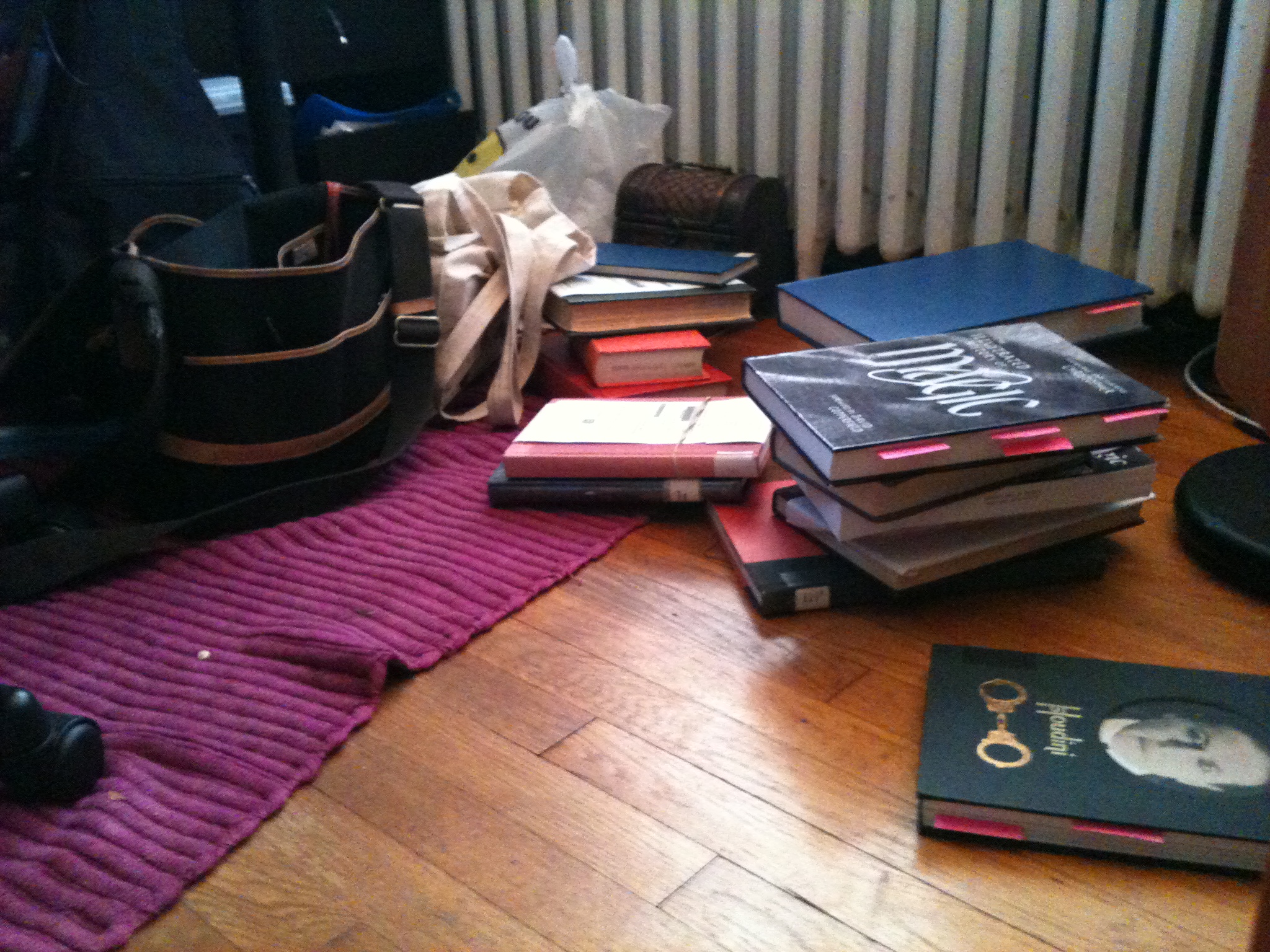Right now, I’m living with some really interesting roommates.
You may recall last year at about this time when I announced that my current couch-surfer was RSC director Peter Brook. This is a similar situation. I find that, when you’re truly in the thralls of research, the process takes on a body of its own. It whispers to you in the night, alternately taunting and teasing you, sometimes telling you things you had never thought of before (though for me, it usually waits to do that until I’m in the shower).
Right now, my research doesn’t have a face (it’s so much easier to personify when it does). More, it has a body. I’m living with a few different projects and, consequently, a few different plays.
As you know by now, I’ve been serving as dramaturge for Tufts’ February production of

book piles next to my desk… teetering dangerously on the brink of collapse
Measure for Measure. Over the summer, the director and I put hours into creating a two-hour cut of the script (no small task, especially for a text-purist like yours truly). Now, we’re girding to enter the rehearsal process. This also means that it’s time for me to send my deep thoughts on the play to the theatre manager for inclusion in the program/department newsletter thingy. I’m also preparing to teach what we’ve lovingly dubbed “Shakespeare Boot Camp” this weekend; a three hour text workshop tag-team-taught by myself and the AD in order to ensure that our cast doesn’t go into the rehearsal process without some tactics to deal with Shakespeare’s language. All of these things should be a lot of fun, it just means that dystopian governments and broken chastity vows are constantly at the back of my mind. Not the most pleasant backdrop for your day, let me tell you.
There’s a lot at stake in Measure (and certainly a lot at stake which speaks to us particularly in an election year). We’re dealing with a city built on crumbling foundations. We’re dealing with an aging government that can no longer connect to its people. We’re dealing with extremists; extreme absolutists, extreme libertines, and extreme fundamentalists. We’re dealing with characters who disguise themselves for various reasons and utilize that disguise to trick each other into pursuing courses of action which would otherwise have proved impossible (or at least unpalatable).
We’re also dealing with a comedy that isn’t all that comedic. The ending seems a mere nod at the conventions of comedy (every one of the play’s four marriages are forced/arranged either by law or circumstance). Death is an ever-present force on the stage and at least one character suffers a grisly demise during the play’s action. The play includes a rape or near-rape (depending on how it’s staged). Oh certainly we have a few clowns to lighten the mood, but there is nothing airy or fairy about Measure‘s deeper themes (or even its not-so-deep themes).
The instinct to call Measure a “problem play” and leave things at that is one that I find horribly simplistic. It’s like calling Richard III a history. While I understand the need for short-hand categories, reducing Shakespeare’s more complicated works to one catch-all word does them a disservice. Yup, Measure has its problems, but the play is so much more than those problems. The problems open avenues of exploration through which we can delve into something deeper; what makes a comedy? What does a comedy need to have? If a play has all those things, can it still be something else?

My desk right now with books and sundry stacked work
In addition to this, a second specter has been haunting my footsteps similar to its iconic title character’s father. Hamlet seems to be everywhere I turn (more so this semester than usual). In a little over a week, I will be in Nashville at ASTR speaking about a paper I wrote which involves Garrick, Hamlet, Shakespeare, and the canonization of all three. Hamlet remains the most-referenced play in my studies, there are at least two productions of the show going on in Boston right now, and I’m relatively certain that the other night I dreamed I was performing the “too too solid flesh” speech in front of an audience of extremely intelligent (and extremely receptive!) chimpanzees…
Is Hamlet is in this fall? Is it my personal bias? Or is there just something about Hamlet?
That’s not even to consider the two research projects/seminar papers which are still in their budding stages at the moment. I haven’t yet immersed myself in them completely enough to be having haunting visions or dreams, but it’ll happen sooner rather than later.
Suffice to say that things are getting pretty crowded over here. I’m pretty sure that I could build a fort with the library books on the floor next to my desk, and (as usual) the deeper I plunge into the semester, the more appealing this course of action becomes.
Password is “foul fiend flibbertigibbet”. No boys allowed.
…except my man Will. And maybe a certain Danish Prince.

